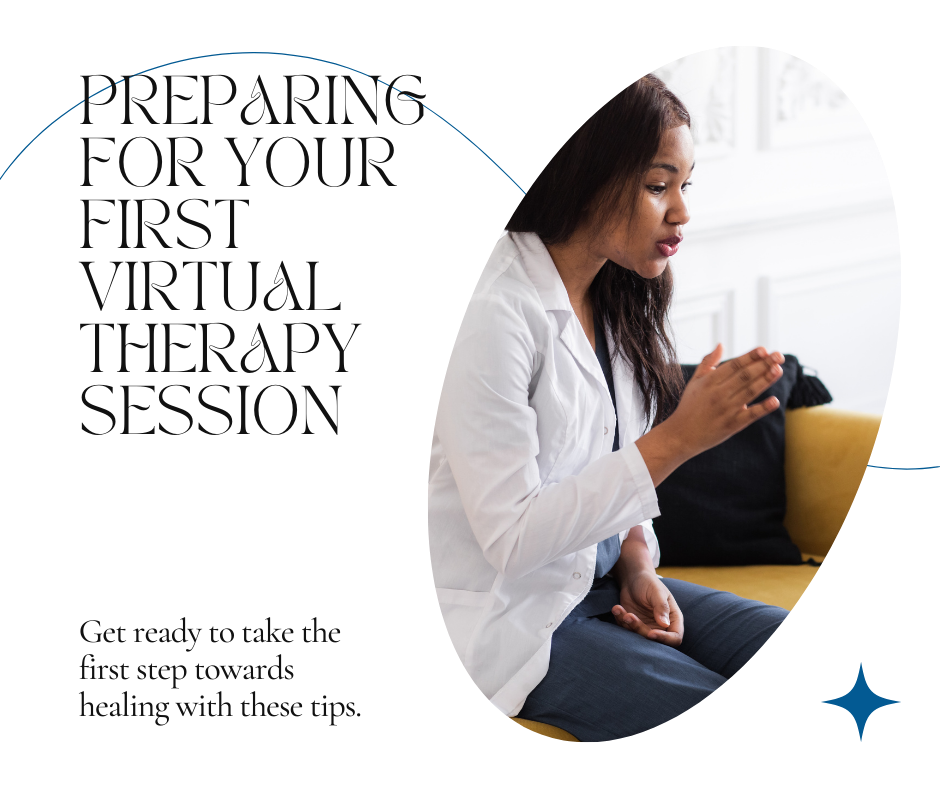How to Prepare for Your First Virtual Therapy Appointment

Updated 1/5/2022
At CareMe Health, we understand that starting therapy can be a big step for many people. It’s normal to feel a bit nervous or unsure of what to expect before your first session. But our therapists and dedicated Coaches are here to help you each step of the way.
What is therapy?
Therapy in mental health refers to a treatment process in which a person with emotional, psychological or mental health issues engages in a talk therapy session with a trained mental health professional, such as a psychologist, counselor or therapist. The goal of therapy is to help individuals better understand their thoughts, feelings, and behaviors and provide them with coping strategies and tools to improve their mental well-being and overall quality of life. It can take many forms, including individual therapy, group therapy, or family therapy, and can use various approaches, such as cognitive-behavioral therapy, talk therapy, and psychodynamic therapy.
What To Do Before Your First Session
By preparing in advance, you can make the most of your time with your therapist and get the most out of your therapy experience. Here are some things to keep in mind before your first therapy session.
- Find a private and quiet space where you can have the session without interruption. This could be a room in your home, or a quiet area in a park or library. Having a dedicated space where you can focus on your therapy session can help you feel more comfortable and relaxed.
- Gather any relevant information, such as medical history, that you may need to share with your therapist during the session. This will help your therapist understand any underlying issues or conditions that may be impacting your mental health.
- Make a list of specific issues or concerns that you would like to discuss during the session. This will help you stay focused and make the most of your time with your therapist.
- Be open and honest with your therapist. Remember that therapy is a safe and confidential space where you can talk about whatever is on your mind without judgment. It’s normal to feel a bit nervous or unsure of what to say before your first session, but your therapist is there to help you through it.
- Dress comfortably and have a glass of water ready. Being comfortable and hydrated can help you feel more relaxed and focused during the session.
- Try to be punctual and have a good time management for the session. Being on time for your session shows respect for your therapist’s time, and also allows you to make the most of your time in therapy.
- Remember that therapy is a process, and the first session is just the beginning. It’s important to be patient and persistent in working through your issues. You may not see immediate changes, but with time and effort, therapy can help you make lasting positive changes in your life.
Starting therapy can be a big step, but with a little bit of preparation, you can make the most of your first session and start your journey towards better mental health. Remember to be patient and persistent, and to trust in the process of therapy. With the right therapist and the right approach, you can make lasting positive changes in your life.
Questions to Ask Your Therapist
- What is your approach to therapy, and how does it align with my specific needs and goals?
- How will we measure progress in therapy, and what can I expect in terms of timing and frequency of sessions?
- How will we communicate outside of sessions? Will you be available for phone or email communication if needed?
- Are there any specific techniques or tools that you use in therapy?
- How do you handle confidentiality and privacy in therapy?
- How do you handle crises or emergency situations?
- How do you involve family or significant others in therapy, if at all?
- Are you comfortable and experienced in addressing specific issues or concerns that I have, such as trauma, addiction, or a specific mental health condition?
- Are there any self-care or homework activities that you recommend I do between sessions?
- Are you comfortable in working with other providers such as psychiatrist or physician if needed?
These questions can help you gain a better understanding of your therapist’s approach and experience, and ensure that you and your therapist are a good match for each other. It’s also important to remember that therapy is a collaborative process, and you should feel comfortable discussing any concerns or questions you have with your therapist at any time during the course of therapy.
To learn more, request a free consultation with a coach or or visit our website.
Related Articles

Letting Go With Grace: Emotional Tools for Closure
Letting go is never easy. Whether we are parting ways with a loved one, ending a relationship, leaving a job, or saying goodbye to a cherished chapter of life, the emotional weight can feel overwhelming. Yet, closure is essential for our emotional well-being. Without it, we carry unresolved grief, anger, regret, or longing that can seep into new relationships and experiences, holding us back from healing and growth.

Breakup Blues: How to Cope and Rebuild Your Self-Worth
A breakup often feels like a silent earthquake—unseen by others but devastating within. The pain doesn’t just come from the loss of a relationship, but from the crumbling of the life, identity, and future you built with another person. You may find yourself questioning your worth, doubting your value, and feeling isolated even when surrounded by people. In Indian society, where emotional expression is often discouraged and breakups can be stigmatized, this pain may feel even more overwhelming. But the truth is—while breakups may shake you, they do not define you. You are not broken; you are in a process of emotional reformation. And with the right tools, guidance, and support system, you can rebuild not just your self-worth but also your entire life narrative.

Healing After Heartbreak: A Mental Health Perspective
Heartbreak doesn't just break your heart—it can shatter your sense of identity, peace, and purpose. Whether the end was expected or abrupt, mutual or one-sided, short-lived or long-term, the aftermath often leaves people emotionally disoriented. In Indian culture, where societal expectations and family involvement in romantic relationships are prevalent, the pain is not just personal—it is public. Yet, very few are taught how to heal from emotional loss in a healthy, sustainable way.

Boundaries in Love: Saying ‘No’ Without Guilt
Love, in its truest form, should be a safe space—a space where individuality is not only respected but celebrated. Yet, in many relationships, especially in the Indian cultural context, love is often misunderstood as constant availability, complete sacrifice, and putting the other person first, always. As noble as this may sound, this version of love often leads to emotional exhaustion, suppressed resentment, and the erosion of one’s identity.

Gaslighting in Relationships: What It Is and How to Heal
Gaslighting is a form of emotional abuse that erodes your ability to trust your own perception. It’s a slow, insidious process that often begins with subtle doubts and ends with complete self-questioning. In romantic relationships—especially in the Indian context where silence, compromise, and duty are often mistaken for love—gaslighting can be even harder to recognize.

How Depression Can Affect Your Relationship—And What You Can Do
Depression is not just an internal struggle—it ripples outward, affecting relationships, routines, and the emotional fabric that holds people together. When someone is dealing with depression, it's not only their world that becomes dim—it can cast a shadow over their most intimate connections too. In a country like India, where open conversations about mental health are still rare and love is often equated with endurance, depression within a relationship can become invisible, misunderstood, or misjudged.
